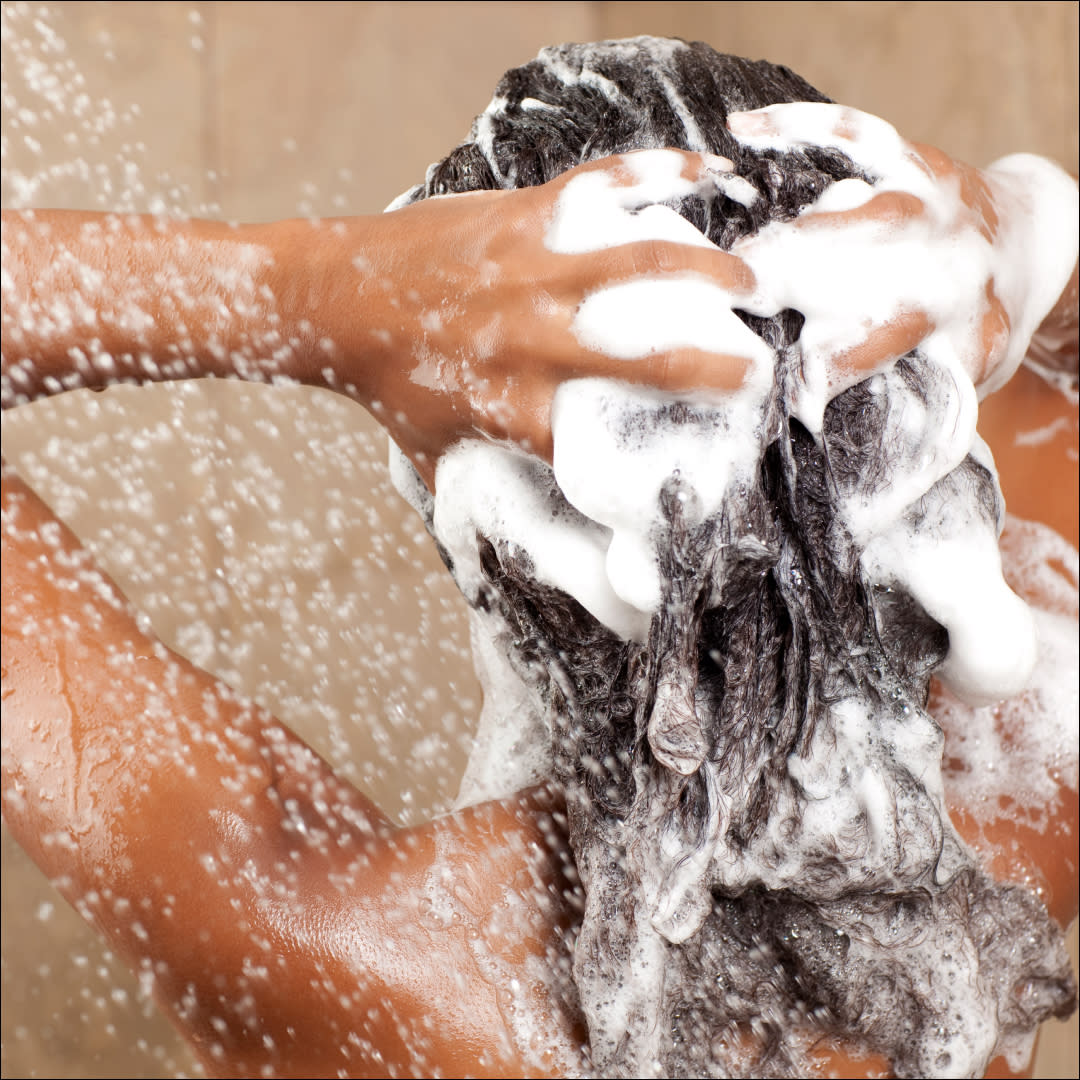Reverse Washing Your Hair: What to Know, According to Experts

I don't know about you, but I've been washing my hair using pretty much the same way for as long as I can remember. In fact, I barely put any thought into my process as I grab my favorite shampoo and conditioner and dive in. Every once in a while, I throw in a hair mask, deep conditioner, or scalp treatment, but the bare bones of my regimen remain basically the same. So when I learned that some of the fellow hair aficionados in my social circle started reverse washing their hair, I immediately became intrigued and had to learn more.
"Reverse washing means to reverse the steps in which you wash your hair," explains celebrity hairstylist Glenn Ellis. "So, traditionally you go in and shampoo first and then condition. With reverse washing, you’ll do conditioner first, then shampoo."
This sounds easy enough, but if there's anything I learned from our expert-driven guides on how to wash, how often to wash, and how to co-wash hair, it's that there's no one-size-fits-all routine. Washing your hair, like applying skincare, depends on your personal needs, lifestyle, and hair type. So I asked Ellis to unpack all things reverse washing, from how to do it to who should engage.
How To Reverse Wash Your Hair
If you're perturbed by the prospect of switching up your tried-and-true hair wash schedule, don't be! Making the switch to reverse washing is far easier than you think.
"Start by applying conditioner to your hair. I always recommend mids to ends, avoiding the roots," Ellis advises. "I also always tell my clients to let it sit for a few minutes so the hair can soak it up. Then, go in with your shampoo, and shampoo your hair. Make sure to really get it lathered, and rinse it out fully."
Et voilà! That's all there is to it.
Why Reverse Wash?
And why should you consider reverse washing? As with all matters haircare, consider your strands' current state and needs. In particular, check if your hair is feeling lank, oily, or dirty.
"Sometimes conditioners can leave the hair feeling weighed down," says Ellis. "With reverse washing, you ensure that it is fully out of the hair."
He adds that reverse washing also ensures that you're completely cleansing those thick conditioners from your scalp and hair.
"Oftentimes, clients don’t rinse the conditioner out all the way, and it really weighs the hair down and can make it look dirty on thinner hair," he warns. "I recommend clients with super fine hair to reverse wash to make sure that their hair is getting the moisture from the conditioner without running the risk of it being weighed down from an improper rinse."
In short, if you've found yourself leaving the shower with your mane feeling dirty, oily, or improperly cleansed, consider switching to reverse washing as a way of guaranteeing a full, clarifying wash.
Who Should—And Shouldn't—Reverse Wash
While reverse washing can result in fantastic benefits, keep in mind that it's not suitable for all hair types. Specifically, Ellis recommends reverse washing "for clients with thinner and finer hair" because this particular texture is most prone to being weighed down by heavy conditioners and oils.
He also notes that while people of all hair densities can choose to reverse wash, he would discourage those with curly or natural hair from doing so. Those hair types, he says, "need moisture, and I often recommend leaving a little conditioner in their hair when rinsing."
So if your hair falls on the textured side, try a shampoo made for curly hair or natural hair, and consider tacking a leave-in conditioner onto your routine, too.
The Best Products for Reverse Washing
There are countless shampoos on the market, from drugstore shampoos to hair growth shampoos and everything in between. But if you need a bit of guidance on where to start, scroll on for some expert- and reviewer-approved options.

Milbon Inphenom Shampoo
Ellis calls this salon-quality line one of his favorites, and specifically recommends its shampoo for those interested in starting their reverse washing journeys.
Pros: expert-approved; softening; controls frizz; color-enhancing
Cons: contains sulfates

Davines Momo Hydrating Shampoo
Looking to reverse wash but not looking to dry out your hair? Try this ultra-hydrating option from Davies Momo, formulated to fully cleanse your scalp without turning your strands into straw. Ellis cites it as another one of his reverse washing go-to brands.
Pros: expert-approved; hydrating
Cons: strong scent

Paul Mitchell Tea Tree Special Conditioner
Often, people with oily hair tend to also suffer from an oily scalp. If your scalp is irritated and you need some relief, try this conditioner from Paul Mitchell, formulated with tea tree oil to soothe angry scalps. Reviewers of all hair types and densities say that using it went a long way in restoring balance to their scalps and bounce to their hair.
Pros: vegan; cruelty-free; supports scalp health
Cons: contains silicones

Lush BIG Shampoo
If you're tired of your thin hair looking lank, this sustainable shampoo from beloved brand Lush might be the best bet for you. One reviewer writes that it "makes my thin, fine hair feel soft and full with body."
Pros: sustainable; cruelty-free; great for thin hair; volumizing
Cons: may be too drying for some

Everist Waterless Conditioner Concentrate
I've tried this sustainably packaged conditioner myself, and can attest to its efficacy. Not only is a conditioner concentrate perfect for travel, but it also last for ages. Remember: With concentrates, a little goes a long way! Plus, it's made for lightweight conditioning, so if you're struggling with greasy hair days, you don't have to worry about your product exacerbating your struggles.
Pros: sustainable approach (concentrate); long-lasting; silicone-free
Cons: can be hard to squeeze out of the tube

